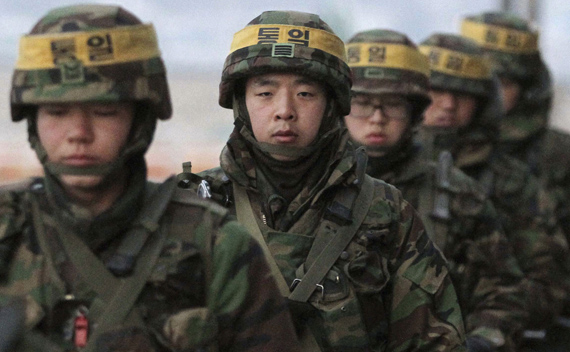Inter-Korean Tensions and the Risks of ‘Friendly Fire’
More on:

Two South Korean marines guarding an island near the West Sea demarcation line that has been the site of several inter-Korean incidents in recent years last Friday mistakenly shot their K-2 rifles at a Korean civilian airliner traveling from Chengdu with 119 passengers on board that was making a final approach for landing at Incheon International Airport. The plane was too far away to be in danger, but the incident drew a public apology from the ROK Ministry of National Defense and a request to South Korean authorities to ensure air safety from the PRC Foreign Ministry spokesperson. Setting aside the mildly unsettling fact that I flew out of Incheon the following day, the incident illustrates the dangers of accidental conflict that accompany heightened tensions following the breakdown of inter-Korean talks following last year’s military incidents between the two Koreas.
The incident highlights the dilemma that the government of the Republic of Korea faces regarding how to calibrate an effective response to North Korean provocations without inadvertently contributing to heightened tension. South Korean Defense Minister Kim Kwan-jin has repeatedly stated that South Korea would surely respond to North Korean provocations and prominent recommendations by a South Korean civilian-led Commission for National Security Review released last December has advocated a revised policy of “proactive deterrence” under which South Korea has a right to self-defense, including preemption, in the event of a North Korean attack. Revised rules of engagement designed to equip frontline soldiers with the tools necessary to respond rapidly and lethally to future North Korean aggression also carry with them enhanced risk that a field-level response to a perceived North Korean threat could result in unintentional escalation, regardless of the decisions or desires of the commander-in-chief.
The Lee Myung-Bak administration has shown impressive maturity and restraint in its responses to last year’s North Korean provocations, but opinion polls taken following the latest incident last December reveal understandable South Korean public frustration with what was perceived as an inadequate South Korean military response, a factor that reduces the political margin for restraint when the next inter-Korean incident occurs. South Korea’s self-restraint has earned high trust from Washington, but U.S. officials and U.S. Forces Korea commanders on the ground have continued to show concern that the current situation carries with it inherent and needless risks of escalation that may not be easily controlled.
In fact, the threat of escalation to civilian aviation at Incheon International Airport is a clear example of the vulnerability and costs that South Korea might incur if an inter-Korean incident were to expand to involve surface-to-air or air-to-ground components. The most tragic outcome of heightened inter-Korean tensions would be the prospect of accidental self-inflicted damage to South Korean assets or lives that might result from ‘friendly fire’ under loosened rules of engagement delegated to lower levels. South Korean capacity to deter the North is being improved by strengthening capabilities to defend the vulnerabilities of islands within North Korean artillery range, but when it comes to loosened rules of engagement, the potential unintended consequences of misjudgment suggest that a wiser approach than ‘proactive deterrence’ may still be ‘better safe than sorry.’
More on:
 Online Store
Online Store